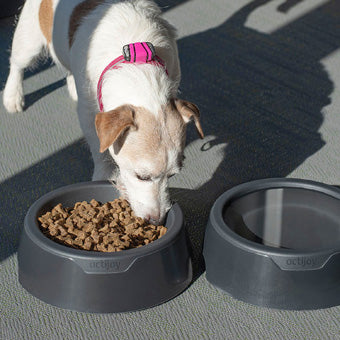What Can I Give My Dog for a Tooth Infection?
What you should – and shouldn’t – give your dog for treatment of a painful tooth infection is discussed, including aspirin, ibuprofen, NSAID pain relievers, and Benadryl.

A tooth infection can be very painful for a dog. Loving pet owners will want to relieve this pain to make their pets feel better. Here, what you can give your dog for a tooth infection, as well as what you shouldn’t give your dog, is reviewed.
Signs of a Tooth Infection

The signs of a tooth infection include reluctant chewing, pawing at the side of the mouth, dropping food, and swelling of the face/eye. Dogs in pain may show signs of aggression, lethargy, and changes in appetite. More information on tooth infections can be found here.
The Actijoy WiFi Food and Water Bowls can alert pet owners to signs of tooth infection or pain. The Actijoy app, which transmits data from the WiFi Food and Water Bowls, will update pet owners of changes in appetite or thirst which can be early warning signs.
Ways to Relieve Pain in Dogs
If you suspect your dog has a tooth infection, you should schedule an appointment with your veterinarian ASAP. If left untreated, an abscessed tooth can lead to serious medical problems for your dog, including death.
However, pet owners may want to relieve pain before seeing their veterinarian. Aspirin can be used for short-term use but should never be given to puppies or dogs with arthritis. The recommended aspirin dosage is 5 – 10 mg / lb of your dog’s body weight, given every 12 hours. Pet owners should be aware that aspirin can have side effects, so giving your dog the lowest dosage possible is recommended. While human aspirin can be used in an emergency, pet owners should consider stocking up on canine pain relievers, which can be found at pet stores.
Never give your dog ibuprofen or an NSAID pain reliever, which can be toxic.
Instead of pain relievers, which can have side effects even in safe dosages, pet owners can administer Benadryl. While Benadryl does not relieve pain, it does have a sedative effect on dogs, which can help make a pet more comfortable until a veterinarian can prescribe antibiotics and the appropriate pain relief. The dosage for Benadryl in dogs is 1 mg per 1 lb of body weight.
Overall, seeing a pet in pain is scary but pet owners have options to ease a dog’s discomfort in the short-term.












